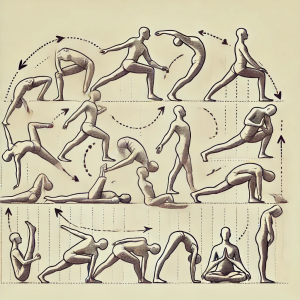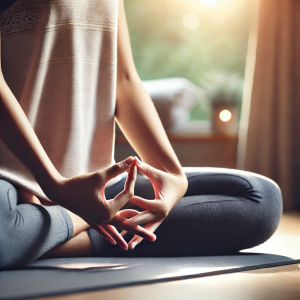By: Dr. Priya Sharma, Tantric Yoga Instructor and Holistic Sexuality Educator
Hatha Yoga is one of the most popular forms of yoga practiced worldwide, known for its ability to balance the body and mind through physical postures, breath control, and meditation. Rooted in ancient traditions, Hatha Yoga offers a comprehensive approach to well-being that enhances physical fitness, mental clarity, and spiritual growth. This article explores the principles, benefits, and practices of Hatha Yoga, providing insights into how it can be integrated into your daily routine for holistic health.

Understanding Hatha Yoga
The word “Hatha” is derived from two Sanskrit words: “Ha” meaning sun and “Tha” meaning moon. Together, they signify the balance of opposing forces, representing the union of body and mind. Hatha Yoga aims to harmonize these energies through a series of physical postures (asanas), breath control (pranayama), and meditation. It is a gentle and accessible form of yoga, making it suitable for practitioners of all levels.

Core Elements of Hatha Yoga
- Asanas (Physical Postures): Asanas are the physical exercises practiced in Hatha Yoga. They improve flexibility, strength, and balance while promoting relaxation and mental focus. Common Hatha Yoga poses include Tadasana (Mountain Pose), Vrikshasana (Tree Pose), and Adho Mukha Svanasana (Downward-Facing Dog).
- Pranayama (Breath Control): Pranayama involves various breathing techniques that regulate the flow of prana (life force energy) in the body. Techniques such as Ujjayi (Victorious Breath), Nadi Shodhana (Alternate Nostril Breathing), and Kapalabhati (Skull-Shining Breath) are used to calm the mind, enhance concentration, and balance the energy centers.
- Meditation: Meditation is an integral part of Hatha Yoga, helping to quiet the mind and connect with the inner self. Practices like mindfulness meditation, guided visualization, and mantra meditation are commonly used to cultivate mental clarity and spiritual awareness.
- Relaxation: Relaxation techniques, such as Savasana (Corpse Pose), are essential components of Hatha Yoga. They allow the body and mind to rest and rejuvenate, promoting a sense of peace and well-being.

The Benefits of Hatha Yoga
- Physical Fitness: Hatha Yoga enhances physical strength, flexibility, and endurance. The practice of asanas helps to tone muscles, improve posture, and increase overall fitness levels.
- Mental Clarity: The combination of physical postures, breath control, and meditation in Hatha Yoga promotes mental clarity and focus. It helps to reduce mental chatter, enhance concentration, and improve cognitive function.
- Emotional Balance: Hatha Yoga supports emotional well-being by releasing tension and stress. The practice encourages mindfulness and self-awareness, helping individuals to manage their emotions and cultivate a positive outlook.
- Stress Relief: The relaxation techniques and breathing exercises in Hatha Yoga are effective in reducing stress and anxiety. They activate the parasympathetic nervous system, promoting a state of calm and relaxation.
- Spiritual Growth: Hatha Yoga provides a pathway to spiritual growth by fostering a deeper connection with the self and the universe. The practice encourages introspection, self-discovery, and a sense of unity with the divine.

Incorporating Hatha Yoga into Your Daily Routine
To fully benefit from Hatha Yoga, it is important to incorporate it into your daily routine. Here are some tips to get started:
- Create a Dedicated Space: Designate a quiet and peaceful area in your home for your yoga practice. This space can include a yoga mat, props (like blocks and straps), and items that inspire you, such as candles, crystals, and spiritual symbols.
- Set a Regular Practice Time: Establish a consistent time each day for your Hatha Yoga practice. Morning or evening sessions are ideal for setting a positive tone for the day or unwinding before sleep.
- Start with Simple Poses: Begin with simple and accessible poses, gradually progressing to more challenging asanas as your practice evolves. Focus on alignment and breath control in each pose.
- Incorporate Breathwork: Include pranayama exercises in your practice to enhance the flow of energy and calm the mind. Spend a few minutes on breath control techniques before or after your asana practice.
- End with Relaxation: Always conclude your practice with a relaxation pose, such as Savasana. This allows the body and mind to integrate the benefits of the practice and promotes a sense of peace and well-being.

Exploring Advanced Hatha Yoga Practices
As you become more comfortable with Hatha Yoga, you may want to explore advanced practices to deepen your experience. Here are some techniques to consider:
- Bandhas (Energy Locks): Bandhas are techniques that lock and direct the flow of energy within the body. Practicing bandhas like Mula Bandha (Root Lock), Uddiyana Bandha (Abdominal Lock), and Jalandhara Bandha (Chin Lock) can enhance the effects of asanas and pranayama.
- Mudras (Hand Gestures): Mudras are symbolic hand gestures used to direct energy and focus the mind. Common mudras in Hatha Yoga include Gyan Mudra (Knowledge Gesture) and Anjali Mudra (Prayer Gesture).
- Mantras and Chanting: Incorporating mantras and chanting into your practice can elevate the spiritual aspect of Hatha Yoga. Chanting sounds like “Om” or reciting traditional mantras can create positive vibrations and deepen your connection with the divine.
- Advanced Asanas: As your practice progresses, you can explore more advanced asanas that require greater strength, flexibility, and balance. Poses like Bakasana (Crow Pose), Sirsasana (Headstand), and Natarajasana (Dancer Pose) challenge the body and mind, promoting growth and transformation.

The Role of a Hatha Yoga Teacher
A knowledgeable and experienced Hatha Yoga teacher can greatly enhance your practice. They can provide guidance on proper alignment, offer personalized modifications, and support your spiritual growth. Consider joining a Hatha Yoga class or seeking private instruction to deepen your understanding and experience of the practice.
Incorporating Hatha Yoga with Other Practices
Hatha Yoga can be seamlessly integrated with other spiritual and wellness practices to enhance its benefits:
- Ayurveda: The ancient science of Ayurveda complements Hatha Yoga by providing dietary and lifestyle guidelines that align with your dosha (body constitution). This integration can enhance overall health and balance.
- Meditation: Combining Hatha Yoga with meditation practices like mindfulness or Vipassana can deepen your spiritual experience and promote inner peace.
- Reiki: Incorporating Reiki, a form of energy healing, with Hatha Yoga can amplify the flow of prana and support emotional and physical healing.
- Nutrition: Following a balanced and nutritious diet that supports your yoga practice can improve energy levels, enhance performance, and support overall well-being.
Hatha Yoga and Modern Science
Modern science is increasingly recognizing the benefits of Hatha Yoga. Research has shown that regular yoga practice can reduce inflammation, lower blood pressure, and improve heart health. It has also been found to enhance brain function, reduce symptoms of depression and anxiety, and improve sleep quality. These scientific findings validate the holistic benefits of Hatha Yoga and its potential to enhance overall health and well-being.
Personal Transformation through Hatha Yoga
Embarking on a journey with Hatha Yoga can lead to profound personal transformation. As you commit to regular practice, you may notice improvements in physical fitness, mental clarity, emotional balance, and spiritual growth. The discipline and mindfulness cultivated through Hatha Yoga can extend to other areas of your life, promoting holistic well-being and a deeper connection with yourself and the world around you.

Conclusion
Hatha Yoga is a holistic practice that balances the body and mind, offering numerous benefits for physical fitness, mental clarity, emotional balance, and spiritual growth. By incorporating Hatha Yoga into your daily routine, you can experience the transformative power of this ancient discipline. Whether you are a beginner or an advanced practitioner, Hatha Yoga provides a pathway to well-being and harmony in mind, body, and spirit.
Dr. Priya Sharma is a certified Tantric Yoga instructor and holistic sexuality educator with a Ph.D. in Integrative Health. With over 20 years of experience, she specializes in guiding individuals through Tantric Yoga practices that enhance both sexual and spiritual energy. Dr. Sharma conducts workshops and private sessions that focus on the integration of yoga, breathwork, and meditation to foster deeper connections and heightened intimacy. Her approach blends ancient Tantric teachings with modern holistic health practices to promote overall well-being and vitality.


